Quantum Physics
Somersaulting spin qubits for universal quantum logic could enhance control in larger arrays
Researchers at QuTech developed somersaulting spin qubits for universal quantum logic. This achievement may enable efficient control of large semiconductor qubit arrays. The research group published their demonstration of ...
6 hours ago
0
13
Plants & Animals
Climate-smart coffee: Researchers explore Robusta coffee as alternative to Arabica
Crave that cup of coffee in the morning? Globally, consumers drink more than 2.2 billion cups daily. Someone grows all that joe: More than 100 million farmers worldwide produce coffee.
3 hours ago
0
40

Parched Central Valley farms depend on Sierras for groundwater
New research shows that California's Central Valley, known as America's breadbasket, gets as much as half of its groundwater from the Sierra Nevadas. This is significant for a farming ...
New research shows that California's Central Valley, known as America's breadbasket, gets as much as half of its groundwater from the Sierra Nevadas. ...
Environment
3 hours ago
0
63

Researchers explore interplay between high-affinity DNA and carbon nanotubes
Single-walled carbon nanotubes (SWCNTs) have emerged as promising candidates for applications in biotechnology and nanoelectronics due to their exceptional physical and chemical properties. ...
Single-walled carbon nanotubes (SWCNTs) have emerged as promising candidates for applications in biotechnology and nanoelectronics due to their exceptional ...
Bio & Medicine
3 hours ago
0
55

Perseverance rover discovers rock with potential signs of ancient life
A vein-filled rock is catching the eye of the science team of NASA's Perseverance rover. Nicknamed "Cheyava Falls" by the team, the arrowhead-shaped rock contains fascinating traits ...
A vein-filled rock is catching the eye of the science team of NASA's Perseverance rover. Nicknamed "Cheyava Falls" by the team, the arrowhead-shaped rock ...
Astrobiology
4 hours ago
0
37
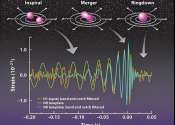
Creation of a deep learning algorithm to detect unexpected gravitational wave events
Starting with the direct detection of gravitational waves in 2015, scientists have relied on a bit of a kludge: they can only detect those waves that match theoretical predictions, which is rather the opposite way that science ...
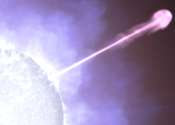
Fermi Telescope finds new feature in brightest gamma-ray burst yet seen
In October 2022, astronomers were stunned by what was quickly dubbed the BOAT—the brightest-of-all-time gamma-ray burst (GRB). Now an international science team reports that data from NASA's Fermi Gamma-ray Space Telescope ...
Astronomy
5 hours ago
0
137
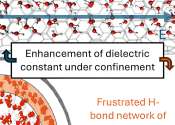
Confined water gets electric: Study reveals dielectric response of water in nanopores
When water gets inside nanopores with sizes below 10 nanometers, new physics emerge: new phases of ice were observed and ultrafast proton transport was measured. Confined water also plays a role in biology, where aquaporins ...
Nanophysics
5 hours ago
0
43
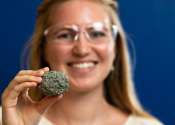
Underground CO₂ storage: Researchers measure carbon mineralization at unprecedented small scale
As we look to the sky above and ponder one of the biggest questions of our time—how to combat the carbon emissions that are driving climate change—a potential answer just may lie beneath our feet, in Earth's deep subsurface.
Analytical Chemistry
6 hours ago
0
32

Climate change will bring more turbulence to flights in the Northern Hemisphere, analysis finds
A type of invisible, unpredictable air turbulence is expected to occur more frequently in the Northern Hemisphere as the climate warms, according to new research. Known as clear air turbulence, the phenomenon also increased ...
Earth Sciences
6 hours ago
0
187

Increasingly erratic rainfall patterns over the past century are likely due to human-induced climate change, study shows
Rainfall fluctuates more vigorously. Why? Scientists say it's because of us. Many people around the world have noticed that rainfall is becoming increasingly erratic. Intense downpours are occurring more frequently, while ...
Earth Sciences
6 hours ago
1
0

OpenAI to challenge Google with new search functionality
OpenAI on Thursday said it was putting its artificial intelligence engine to work in a challenge to Google's market-dominating search engine.
Internet
3 hours ago
0
19

Study identifies two critical genes in pancreatic tumors
University of Toronto researchers have identified two genes that play a critical role in tumor growth in the pancreas—findings that have significant implications for understanding and treating pancreatic cancer.
Oncology & Cancer
5 hours ago
0
22

The Future is Interdisciplinary
Find out how ACS can accelerate your research to keep up with the discoveries that are pushing us into science’s next frontier
 Medical Xpress
Medical Xpress

Study identifies two critical genes in pancreatic tumors

New shingles vaccine could reduce risk of dementia

Scientists identify key protein behind spread of shingles virus

Mutating virus fate reveals key pandemic prep insights

Self-amplifying mRNA vaccines appear safe in lab and animal tests

How a bacterium supports healing of chronic diabetic wounds

We may soon have a faster test for sepsis: Study demonstrates ultra-rapid antimicrobial susceptibility testing method

Exploring consciousness with 'eureka' moments

AI tools reveal complexity of mental health measurement

New protein discovery may influence future cancer treatment

Findings suggest few people get sick after bite from ticks infected with Powassan virus
 Tech Xplore
Tech Xplore

Memristive radiofrequency switches show improved performance for mmWave applications

Scientists' innovation for indoor solar cells maximizes the use of light energy

Using AI to train AI: Model collapse could be coming for LLMs, say researchers

Renewable energy puts power grids to the test

UK govt launches flagship green energy plan

Nissan shares plunge after profit warning
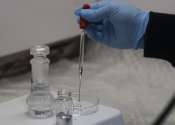
Liquid metals offer potential for greener chemical processes, researchers say
University of Sydney researchers are proposing a new way to curb industrial emissions, by tapping into the "atomic intelligence" of liquid metals to deliver greener and more sustainable chemical reactions.
Analytical Chemistry
6 hours ago
0
1
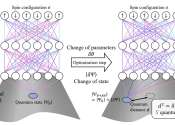
Optimization algorithm successfully computes the ground state of interacting quantum matter
Over the past decades, computer scientists have developed various computing tools that could help to solve challenges in quantum physics. These include large-scale deep neural networks that can be trained to predict the ground ...

Raindrops grow with turbulence in clouds: New findings could improve weather and climate models
Scientists for decades have attempted to learn more about the complex and mysterious chain of events by which tiny droplets in clouds grow large enough to begin falling toward the ground. Better understanding this process, ...
Earth Sciences
7 hours ago
0
96
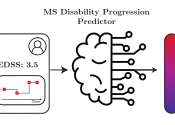
Machine learning shows potential for predicting multiple sclerosis progression
Machine learning models can reliably inform clinicians about the disability progression of multiple sclerosis, according to a study published in the open-access journal PLOS Digital Health by Edward De Brouwer of KU Leuven, ...
Neuroscience
6 hours ago
0
0

A swinging showerhead leads to discovery of a new mode of vibration in nature
During the hot summer of 2020, confined to his Pasadena home during the COVID-19 pandemic, National Medal of Science-winning applied physicist Amnon Yariv took frequent and long showers to cool off. A surprising result, to ...
General Physics
7 hours ago
0
31

New shingles vaccine could reduce risk of dementia
A study of more than 200,000 people by researchers at the University of Oxford found at least a 17% reduction in dementia diagnoses in the six years after the new recombinant shingles vaccination, equating to 164 or more ...
Alzheimer's disease & dementia
7 hours ago
0
36
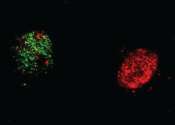
How epigenetics influence memory formation
When we form a new memory, the brain undergoes physical and functional changes known collectively as a "memory trace." A memory trace represents the specific patterns of activity and structural modifications of neurons that ...
Genetics
6 hours ago
0
0

A soft needle in an oceanic haystack: Scientists discover a new species of chordate
The Cambrian fossil record indicates that most animal phyla had diversified and inhabited the Earth's oceans approximately 518 million years ago. But even though chordates—the group that includes vertebrates like humans—were ...
Evolution
8 hours ago
0
55

NASA says no return date yet for astronauts and troubled Boeing capsule at space station
Already more than a month late getting back, two NASA astronauts will remain at the International Space Station until engineers finish working on problems plaguing their Boeing capsule, officials said Thursday.
Space Exploration
7 hours ago
0
69
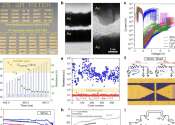
Memristive radiofrequency switches show improved performance for mmWave applications
Radiofrequency (RF) switches are electronic components that control the routing of RF signals between different segments of circuits, for instance turning the signals on and off or redirecting them. These switches are central ...

An effective strategy to inhibit grain coarsening: Construction of multi-element co-segregated grain boundary complexion
To date, ceramic scientists have devised various strategies to impede grain coarsening. The utilization of nano-sized precursor powder can not only facilitate the densification process, but also yields bulk ceramics with ...

Battling the red palm weevil: Investigating the devastation on date palm plantations of the Middle East
The red palm weevil can devastate the valuable date palm plantations of the Middle East. Yet, date producers are still hesitant to apply new technologies that can control this invasive pest. A recent ICARDA study reveals ...

How iBuyers are changing real estate racial disparities and individual homeownership rates in one major city
Instant buyers, also known as iBuyers, rapidly buy and sell homes using automated models to set prices. These companies, such as Opendoor and Offerpad, can turn around cash offers in a matter of hours, and they've captured ...

Protecting your pig from diamond skin disease
Everybody wants to find a diamond in the rough, but no one wants their pig to develop diamond skin disease—an infection that can cause pain and discomfort and may lead to death if left untreated.

Research highlights impact of Ukrainian President Zelensky's traits on global perceptions
A new study reveals that Ukrainian President Volodymyr Zelensky's communal personality traits significantly increase empathy and pro-social behaviors towards Ukrainian citizens amid the ongoing Russia-Ukraine war. The study ...

Important region of marine ecosystem in Southwest Atlantic is shallower than expected, study finds
Researchers at the Federal University of São Paulo (UNIFESP) and the University of São Paulo (USP) have determined, for the first time with precision, the vertical limits of the marine environments in the Southwest Atlantic, ...

Warming has more impact than cooling on Greenland's 'firn,' physics-based model reveals
Scientists have known from ice core research that it's easier to melt an ice sheet than to freeze it up again. Now, they know at least part of the reason why, and it has to do with ice's "sponginess," according to a new study ...

Non-native species are threatening vulnerable Svalbard plant life, study warns
New, non-native plant species are constantly being found in Svalbard, and researchers are working to ascertain what threat these species pose to the native plants.

Surface oxygen functionality controls selective transport of metal ions through graphene oxide membranes
Developing efficient, selective, and scalable separations for critical materials, including lithium and magnesium, is essential to meeting the increasing demands for clean energy technologies and alleviating challenges with ...

Study: Inclusive leadership keeps child welfare workers on the job, benefiting children and families
Child welfare systems have historically dealt with the challenges of high employee turnover, but developing a workplace characterized by inclusive leadership is one way to keep workers on the job and maintain uninterrupted ...

New findings regarding Indian food sustainability
Researchers in India have expanded the well-known theory of planned behavior to obtain useful marketing and policy insights concerning the sustainability choices of consumers when it comes to food. The study, published in ...

Humanity suffering from 'extreme heat epidemic,' UN chief warns
Humanity is suffering from an "extreme heat epidemic," UN Secretary-General Antonio Guterres warned Thursday, calling for action to limit the impacts of heat waves intensified by climate change.

How much growth is required to achieve good lives for all while reducing environmental damage?
Ending mass human deprivation and providing good lives for the whole world's population can be accomplished while at the same time achieving ecological objectives. This is demonstrated by a new study by the Institute of Environmental ...

Findings reveal the unique characteristics of short-chain branched polymers
A research team affiliated with UNIST has made a significant breakthrough in understanding the properties of short-chain branched (SCB) polymers. The findings have far-reaching implications for various industrial applications, ...

Q&A: Algorithmic conspirituality—if you're seeing this, is it meant for you?
Thanks to algorithms, social media platforms can generate content that feels like it's made just for you. And while you may acknowledge that technology is what delivers the content, you may sometimes feel that a higher power ...

A pair of CubeSats using ground penetrating radar could map the interior of near-Earth asteroids
Characterizing near-Earth asteroids (NEAs) is critical if we hope to eventually stop one from hitting us. But so far, missions to do so have been expensive, which is never good for space exploration.

The struggle to unplug: why Kiwis find it so hard to disconnect from the internet
In an age when connectivity is constant, many New Zealanders find it hard to unplug from the internet. Despite a desire to switch off, the reality of disconnecting is challenging. Soon it might even come at a cost.

Image: A Saturnian summer
NASA's Hubble Space Telescope captured this image of Saturn and its colossal rings on July 4, 2020, during summer in the gas giant's northern hemisphere. Two of Saturn's icy moons are also clearly visible: Mimas at right, ...

The road to food security through better plant disease management
The colorful history of plant pathology in Australia since colonization is the subject of a special edition of Historical Records of Australian Science, edited by QAAFI's Associate Professor Andrew Geering.

Expert Q&A: NASA's cancellation of VIPER is a frustrating setback for lunar exploration
In July 2024, NASA announced it canceled its plans to send the Volatiles Investigating Polar Exploration Rover (VIPER) to the moon's southern polar region. The rover was meant to search for water and other resources called ...
































































